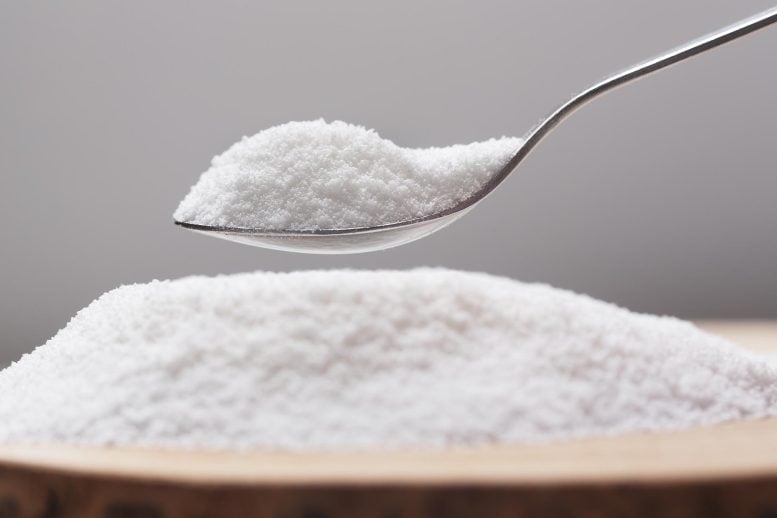
Sucralose changes the gut microbiome, disrupts T cell activity, and reduces the effectiveness of immunotherapy.
Sucralose is a widely used artificial sweetener for people aiming to cut calories or control blood sugar, but new research from the University of Pittsburgh and UPMC Hillman Cancer Center indicates it may not be suitable for patients receiving cancer immunotherapy.
The study, recently published in the journal Cancer Discovery by the American Association for Cancer Research, reported that individuals with melanoma or non-small cell lung cancer who consumed large amounts of sucralose responded less effectively to immunotherapy and had lower survival rates compared with those who consumed little of the sweetener.
Notably, in mouse experiments, supplements that increased levels of the amino acid arginine counteracted the negative influence of sucralose on immunotherapy, pointing to a potential strategy that could be explored in clinical trials.
Arginine as a possible solution
“It’s easy to say, ‘Stop drinking diet soda,’ but when patients are being treated for cancer, they are already dealing with enough, so asking them to drastically alter their diet may not be realistic,” said lead author Abby Overacre, Ph.D., assistant professor in the Department of Immunology at Pitt and UPMC Hillman. “We need to meet patients where they are. That’s why it’s so exciting that arginine supplementation could be a simple approach to counteract the negative effects of sucralose on immunotherapy.”

Senior author Diwakar Davar, M.D., an associate professor of medicine at Pitt and a medical oncologist and hematologist at UPMC Hillman, worked with Overacre and their team to demonstrate in mouse models that the harmful effects of sucralose stem from disruptions in gut bacteria.
The sweetener altered the makeup of the mouse gut microbiome, increasing bacterial species that break down arginine. This shift led to reduced arginine levels in the blood, tumor environment, and stool.
Immune checkpoint inhibitors such as anti-PD1 enhance T cell activity, enabling these immune cells to attack cancer more effectively. Arginine plays a crucial role in supporting T cell function, particularly in the context of cancer.
“When arginine levels were depleted due to sucralose-driven shifts in the microbiome, T cells couldn’t function properly,” said Overacre. “As a result, immunotherapy wasn’t as effective in mice that were fed sucralose.”
In mouse models of adenocarcinoma and melanoma, diets containing sucralose impaired anti-PD1 therapy, resulting in larger tumors and shorter survival. However, when sucralose-fed mice received arginine or citrulline (which the body converts into arginine), the effectiveness of immunotherapy was restored.
Human data and future trials
To assess the relevance of these findings for humans, the researchers looked at 132 patients with advanced melanoma or non-small cell lung cancer who received anti-PD1 therapy alone or in combination with chemotherapy. Patients filled out detailed diet history questionnaires that included questions about how often they consumed artificial sweeteners in coffee, tea, and diet soda.

“We found that sucralose impeded the effectiveness of immunotherapies across a range of cancer types, stages, and treatment modalities,” said Davar. “These observations raise the possibility of designing prebiotics, such as targeted nutrient supplementation for patients who consume high levels of sucralose.”
The researchers hope to launch a clinical trial investigating whether citrulline supplements — which boost arginine levels more than arginine itself — affect the gut microbiome and anti-tumor immune response in patients.
They are also interested in looking at how other sugar substitutes, such as aspartame, saccharin, xylitol, and stevia, impact the immune system and response to immunotherapy.
Reference: “Sucralose consumption ablates cancer immunotherapy response through microbiome disruption.” by Kristin M. Morder, Madison Nguyen, Drew N. Wilfahrt, Zakaria Larbi. Dahmani, Ansen BP. Burr, Bingxian Xie, Michael Morikone, Hector Nieves-Rosado, William G. Gunn, Drew E. Hurd, Hong Wang, Steven J. Mullett, Kaitlin Bossong, Stacy L. Gelhaus, Dhivyaa Rajasundaram, Lawrence P. Kane, Greg M. Delgoffe, Jishnu Das, Diwakar Davar and Abigail E. Overacre-Delgoffe, 30 July 2025, Cancer Discovery.
DOI: 10.1158/2159-8290.CD-25-0247
This research was supported by the National Institutes of Health (DP2AI177967, S10OD023402, S10OD032141, R01CA206517, R01AI138504, T32GM008208, U01 CA271407, R01 CA257265, U01 CA268806 and P50 CA254865), the Damon Runyon Cancer Research Foundation and Gateway for Cancer Research (G-22-800).
Never miss a breakthrough: Join the SciTechDaily newsletter.